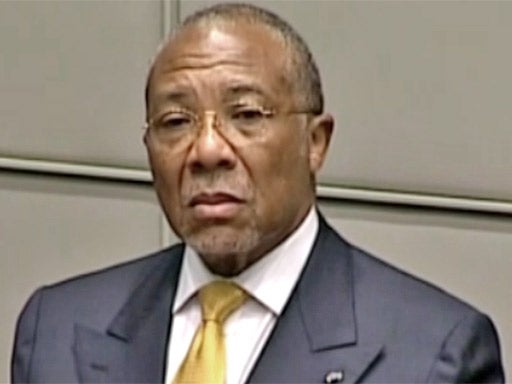50-year term for Charles Taylor heralds 'new era of accountability'
Rights groups hail jailing of Liberia's former president for horrific war crimes in Sierra Leone

The former Liberian President Charles Taylor has been sentenced to 50 years in prison for aiding and abetting some of the worst war crimes in history.
Judges at the first international tribunal to convict a former head of state since the end of the Second World War said the decision meant the world was entering a "new era of accountability".
The former warlord fought his way to the presidency of Liberia during a maelstrom of interlinked civil wars in West Africa during the 1990s funded by illegal timber and diamond sales and marked by horrific mutilations, sexual violence and the use of child soldiers. Six years after being arrested and handed over to a UN-backed tribunal he was convicted for his role in supporting a rebel group fighting in neighbouring Sierra Leone.
Prosecutors had pushed for 80 years and may appeal the sentence. Mr Taylor is also expected to appeal. Should that effort fail he will be transferred from the Netherlands to a prison in Britain.
The 64-year-old's conviction by the Special Court for Sierra Leone, and the severity of his sentence, has prompted a debate over what message is being sent to current heads of state accused of war crimes. Sudan's Omar al-Bashir has been indicted by the ICC for alleged war crimes in its Western region of Darfur; Ivory Coast's Laurent Gbagbo will soon go on trial at The Hague and members of the Gaddafi regime in Libya have also been investigated.
Mr Taylor's lawyer, Courtenay Griffiths, said that the judges' refusal of leniency – even though his client had stepped down and moved into voluntary exile in Nigeria in 2003 – was sending the wrong message to leaders like Syria's Bashar al-Assad. "Maybe the lesson is: if you are a sitting leader and the international community wants to get rid of you either you get murdered like Colonel Gaddafi or you hang on until the bitter end," Mr Courtenay said. "I'm not so sure that's the signal this court ought to be transmitting."
But most rights advocates hailed the sentence as an important precedent for an emerging international justice system. "It is really significant that Taylor's status as a former head of state was taken as an aggravating factor as far as his sentence was concerned," Geraldine Mattioli-Zeltner, of Human Rights Watch, said. In passing sentence, the judges said Mr Taylor's "special status" as a head of state was a factor in his sentence. Ms Mattioli-Zeltner welcomed a "very important precedent" that she hoped Syria's and Sudan's leaders would take note of.
The jailing of Mr Taylor has been broadly welcomed in Sierra Leone but there has been criticism in his native Liberia, where some see him as the victim of selective justice. There has been no equivalent tribunal to look into Liberia's own civil war and the recommendations of a locally run Truth and Reconciliation Commission have largely been ignored. Patrick Alley, of the watchdog group Global Witness, said the Taylor trial should be followed by a similar court for Liberia that would also allow for the prosecution of those who profited from the African wars.
Doing time in the UK: War criminals in jail
Charles Taylor joins a select group of convicted war criminals who will spend time inside the British prison system – though the date when he is taken through the jail gates is likely to be delayed for months by an appeal.
No decision has yet been made on where Taylor will eventually go, but the experiences of those who have gone before him suggests it will not be a comfortable experience. Three men convicted of war crimes in the former Yugoslavia have served time in Britain and two of them remain behind bars. They include the Bosnian-Serb general Radislav Krstic who was stabbed in his cell by three Muslim inmates in 2010 at Wakefield Prison where he was serving a 35-year jail term.
Krstic survived the attack – apparently in retaliation for the massacre of Muslims in the UN safe haven of Srebrenica in 1995 – but he was left with a deep wound in his neck. He played a prominent role in the wars that led to the break-up of the former Yugoslavia.
His three attackers, all of them convicted killers, had plotted the attack after learning he was heading to the prison. They were given concurrent life sentences.
Momcilo Krajisnik, a prominent member of the Bosnian-Serb leadership during the war, is also serving 20 years for murder and other crimes during the war.
What arrangements will be made for Taylor is unclear. The Foreign Office said there had been no decision on whether the former warlord will be held in a top security prison or held in a solitary cell.
The deal to take Taylor to Britain followed an offer by then foreign secretary Margaret Beckett. The Dutch government had offered to host the trial but said that it would only do so if another country offered to imprison him if he was convicted.
Paul Peachey
Join our commenting forum
Join thought-provoking conversations, follow other Independent readers and see their replies
Comments
Bookmark popover
Removed from bookmarks